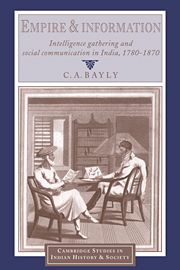Book contents
- Frontmatter
- Contents
- List of maps
- Preface
- Glossary
- List of abbreviations
- Introduction
- 1 Prologue: surveillance and communication in early modern India
- 2 Political intelligence and indigenous informants during the conquest of India, c. 1785–1815
- 3 Misinformation and failure on the fringes of empire
- 4 Between human intelligence and colonial knowledge
- 5 The Indian ecumene: an indigenous public sphere
- 6 Useful knowledge and godly society, c. 1830–50
- 7 Colonial controversies: astronomers and physicians
- 8 Colonial controversies: language and land
- 9 The information order, the Rebellion of 1857–9 and pacification
- 10 Epilogue: information, surveillance and the public arena after the Rebellion
- Conclusion: ‘Knowing the country’
- Bibliography
- Index
6 - Useful knowledge and godly society, c. 1830–50
Published online by Cambridge University Press: 28 October 2009
- Frontmatter
- Contents
- List of maps
- Preface
- Glossary
- List of abbreviations
- Introduction
- 1 Prologue: surveillance and communication in early modern India
- 2 Political intelligence and indigenous informants during the conquest of India, c. 1785–1815
- 3 Misinformation and failure on the fringes of empire
- 4 Between human intelligence and colonial knowledge
- 5 The Indian ecumene: an indigenous public sphere
- 6 Useful knowledge and godly society, c. 1830–50
- 7 Colonial controversies: astronomers and physicians
- 8 Colonial controversies: language and land
- 9 The information order, the Rebellion of 1857–9 and pacification
- 10 Epilogue: information, surveillance and the public arena after the Rebellion
- Conclusion: ‘Knowing the country’
- Bibliography
- Index
Summary
Historians once called the 1830s and 1840s the Age of Reform and discerned in it the beginnings of Indian modernisation. Eric Stokes, in particular, emphasised the influence of utilitarian and evangelical ideas on the Government of India during the rule of Lord William Bentinck and his successors. Later writers, including Stokes himself, abandoned this position and asserted that the conflict of ideologies represented no more than ‘one clerk talking to another’. The Age of Reform was rewritten as an age of hiatus, when social change was crippled by economic depression and government penury. This chapter will argue that British reform may well have been contradictory and ineffectual, but the medium of the reformers was no less important than their message. For the deepest changes of this era can be seen in the information order: the rapid diffusion of print media into north Indian society, the further movement of government away from human intelligence to statistical surveys, and the introduction of public instruction as a goal of the state. This chapter will examine these changes and show how the guardians of the Indian ecumene responded to them with speed and flexibility, appropriating some innovations and rejecting others.
Indians and the Anglo-Indian public sphere, c. 1780–1830
The British introduced to India not only a knowledgeable bureaucracy but also their own energetic style of public debate. The expatriates never fashioned a Creole nationalism. They were too small in numbers, too dependent on Crown and Company and too divided from Eurasian and Indian society by racial exclusiveness to accomplish this. Controversies amongst them raged nevertheless in press and pamphlet and Indian issues became entangled with domestic political divisions.
- Type
- Chapter
- Information
- Empire and InformationIntelligence Gathering and Social Communication in India, 1780–1870, pp. 212 - 246Publisher: Cambridge University PressPrint publication year: 1997



